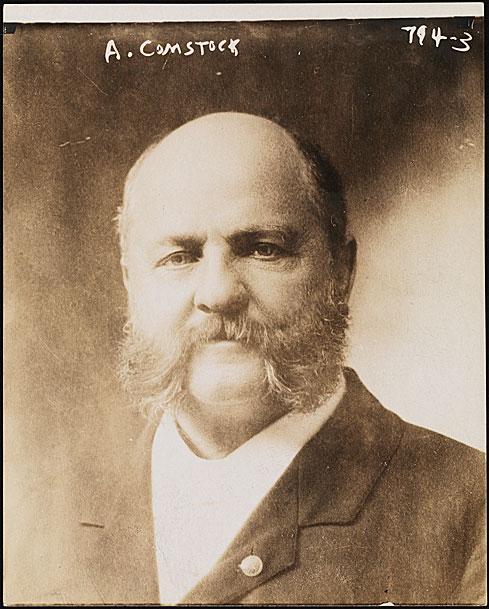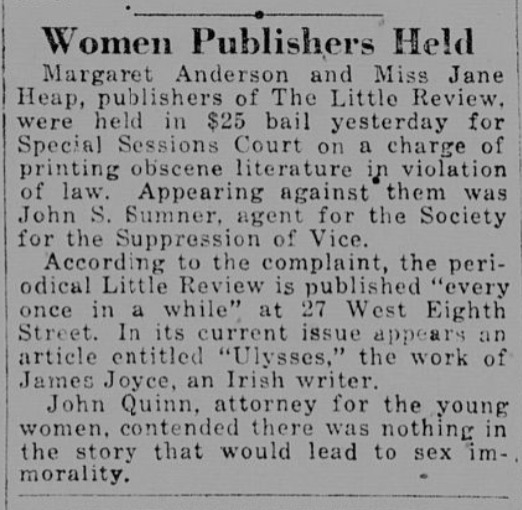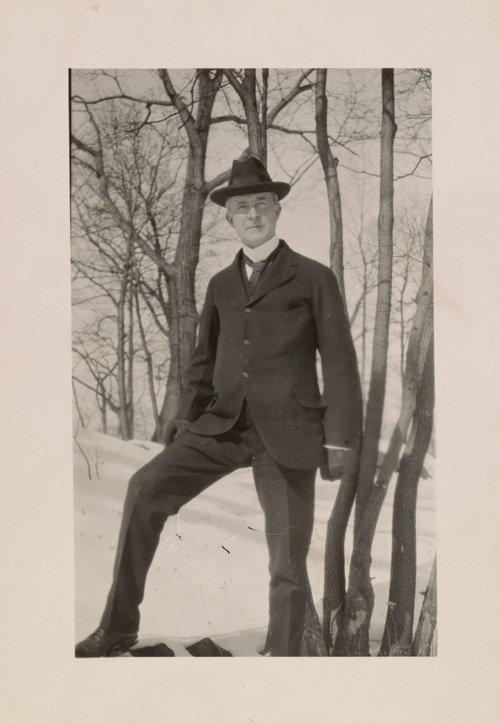The Trial
Anthony Comstock was born in Connecticut in 1844. A devout Christian, he moved to New York City after serving in the infantry in the American Civil War. When he arrived in the city, he was reportedly horrified by the prevalence of what he considered to be ‘pornagraphic’ content (risque or explicit novels, pamphlets, images, and individuals) within the city’s public sphere.
Comstock created the New York Society for the Suppression of Vices in 1872 with the help of the Young Men’s Christian Association and other powerful New York personalities. The society’s dedicated purpose was publicly objecting to and halting the dissemination of lewd material.
In 1872 Comstock co-authored an anti-obscenity bill covering everything from published material to the use of birth control. The bill, which would come to be known as the “Comstock Act,” was passed by congress on March 3, 1873 and prohibited the “production, sale, or shipment through mail of any obscene, lewd, or lascivious and every filthy book, pamphlet, picture, paper, letter, writing print or other publication of an indecent character…” This piece of legislation became the basis for the anti-obscenity laws which led to the prosecution of The Little Review following the publication of Ulysses.
The Comstock Act was the legislature that allowed for the arrest of Anderson and Heap, and the prosecution of The Little Review following the publication of Ulysses. The NYSSV argued that the magazine violated the Comstock Act as the published episode contained ‘indecent’ material and was distributed using the United States postal service.
The New York Society for the Suppression of Vices became more powerful following the passing of the Comstock Act. Comstock was given the position of “Special Agent of the Postmaster General,” which allowed him to inspect U.S. mail and arrest people without warrants. Comstock held this position and acted as the head of the NYSSV until 1915, in which an ‘overthrow’ occurred and Assistant Secretary John S. Sumner took control of the society.
Upon coming into power within the NYSSV, Sumner took a harder stance against what he considered to be obscene art than his predecessor, attacking plays, burlesque shows, and literature. He even managed to send Mae West to jail for eight days following her role in the play Sex.
With Sumner at the head, the NYSSV took The Little Review to court following the publication of what the society considered obscene scenes in Joyce’s novel Ulysses. The society sought to suppress the publication of the magazine issues containing the scene and to prosecute the publishers.
In an attempt to showcase the literary merit of the novel, John Quinn, the attorney representing Anderson and Heap, brought in three ‘literary experts,’ to “testify that Ulysses in their opinion would not corrupt” its readers.
The literary merit of the material had little bearing in the court case, however, as the outcome was dependent on the answer to a single question: under New York law, were the isolated passages in Ulysses presented to the court in violation of anti-obscenity legislation? The answer, in short, was yes.
The NYSSV won the legal battle; both Margaret C. Anderson and Jane Heap were fined $50 for publishing indecent material, and Ulysses was effectively banned in the United States until 1933, when the decision in the court case The United States vs. One Book Called ‘Ulysses’ overturned the decision.
The obscenity trial against The Little Review brought much attention and some criticism to the NYSSV, with newspapers covering the trial outcome. Despite a growing amount of criticism about its ideals and methods, the NYSSV survived until 1950, at which time Sumner retired and the society disbanded.
Sources
“Anthony Comstock's ‘Chastity’ Laws.” PBS, Public Broadcasting Service, Accessed 29 October 2020, www.pbs.org/wgbh/americanexperience/features/pill-anthony-comstocks-chastity-laws/.
Bradshaw, David. “Ulysses and Obscenity.” The British Library, The British Library, 11 Mar. 2016, www.bl.uk/20th-century-literature/articles/ulysses-and-obscenity.
Burnette, Brandon R. Comstock Act of 1873, Middle Tennessee State University, 2009, www.mtsu.edu/first-amendment/article/1038/comstock-act-of-1873.
Evans, Rhonda. “Vice Wars: Researching New York City's Scandalous Censorship Past.” The New York Public Library, The New York Public Library, 25 Sept. 2019, www.nypl.org/blog/2017/09/25/vice-wars.
Gertzman, J.A., “John Saxton Sumner of the New York Society for the Suppression of Vice: A Chief Smut‐Eradicator of the Interwar Period.” Journal of American Culture, 17: 41-47. 1994. doi:10.1111/j.1542-734X.1994.00041.x
Pagnattaro, Marisa Anne. “Carving a Literary Exception: The Obscenity Standard and ‘Ulysses.’” Twentieth Century Literature, vol. 47, no. 2, 2001, pp. 217–240. JSTOR, www.jstor.org/stable/827850. Accessed 2 Nov. 2020.





